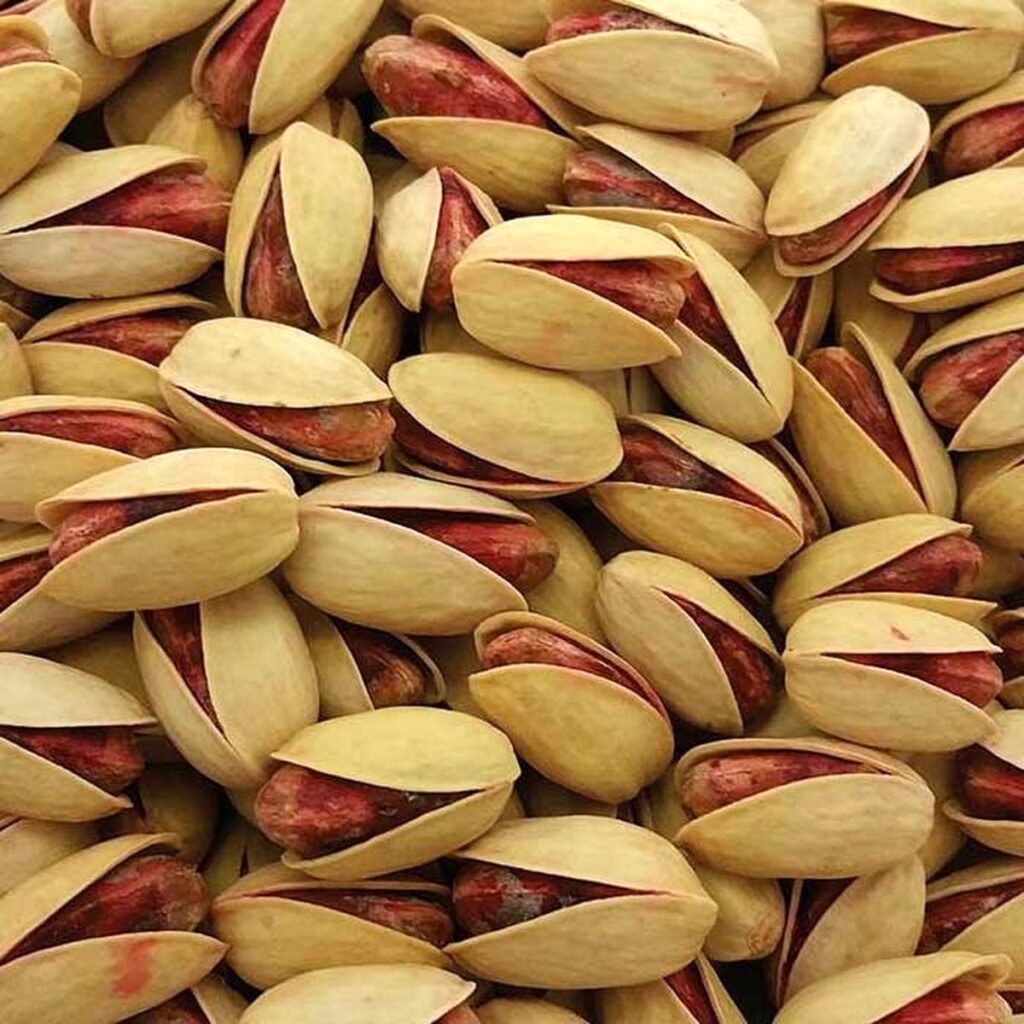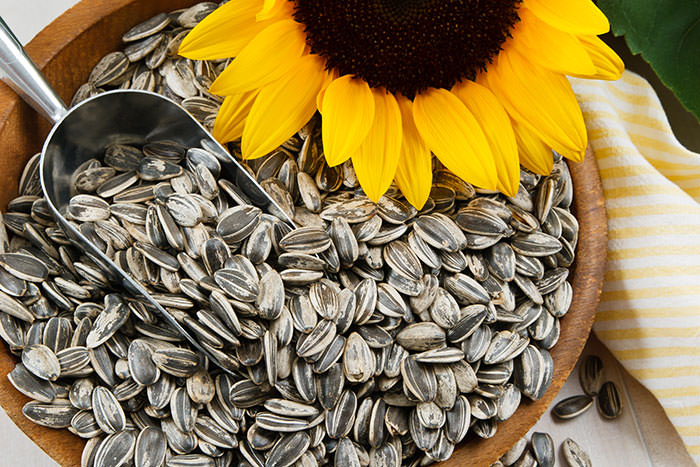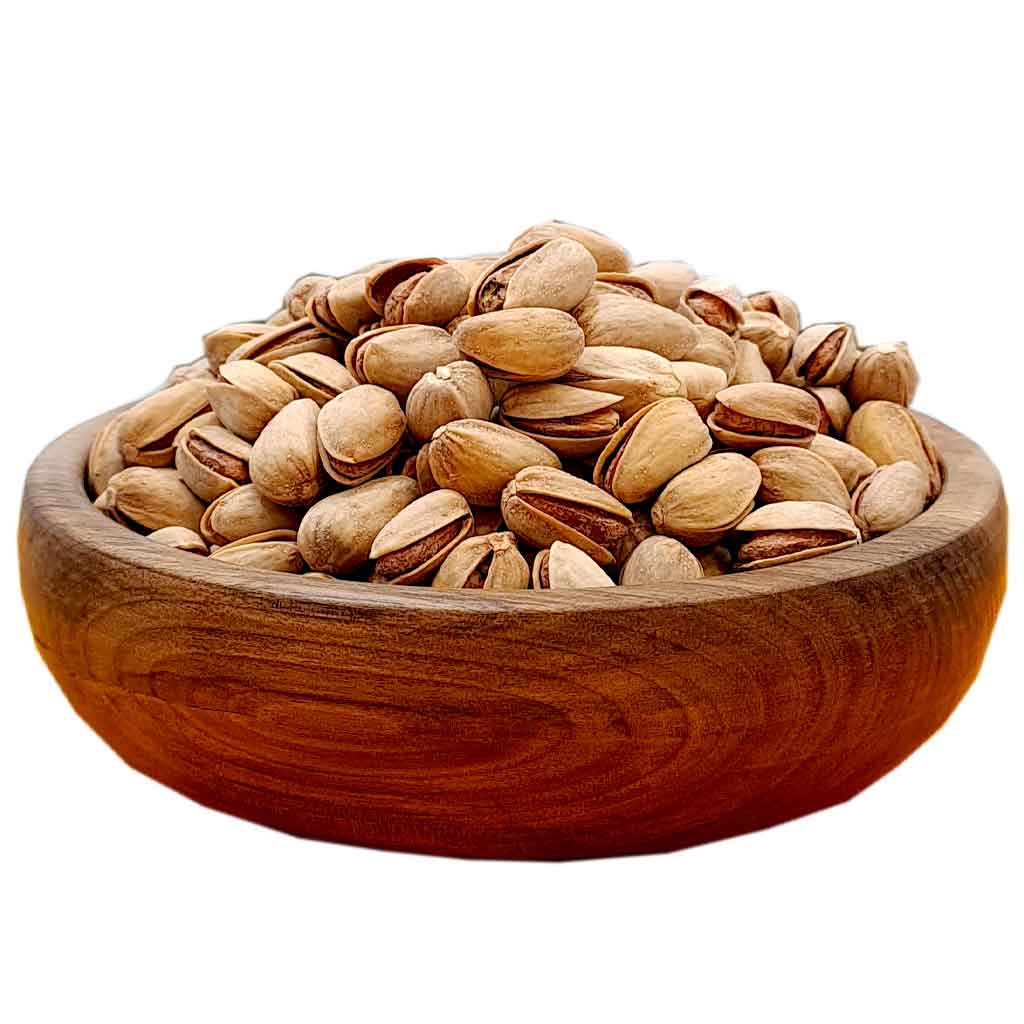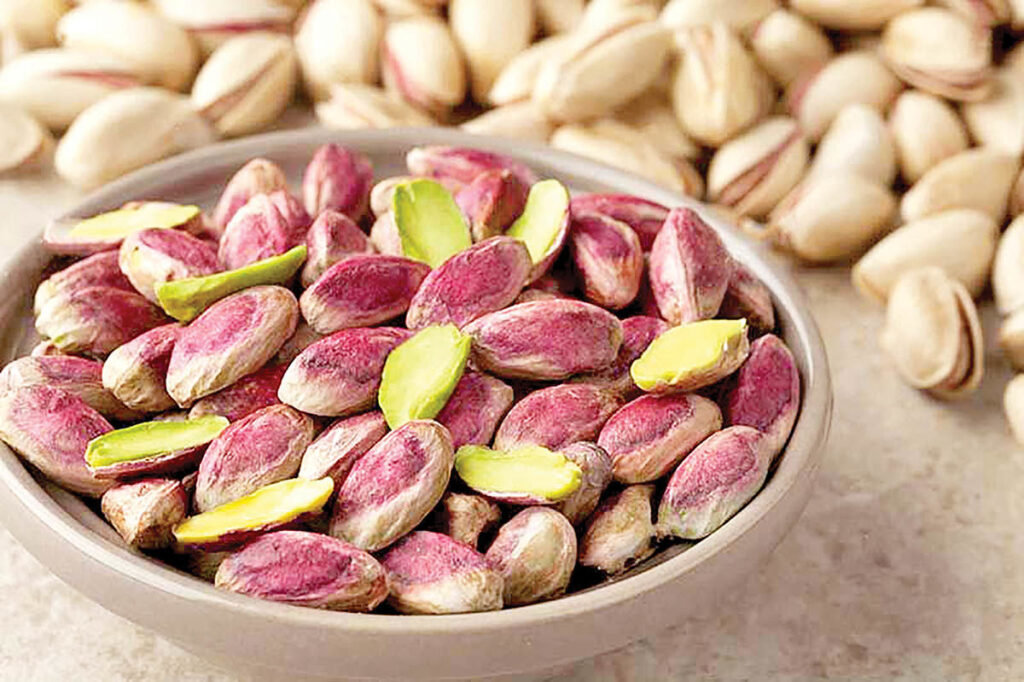The biggest edition in Gulfood’s history brought together over 5,000 leading food and beverage companies, showcasing 100,000 new products from more than 125 countries. Filled with countless networking opportunities to develop new business relationships and strengthen existing ones, this year’s show offered a bigger platform to make new partnerships, deals, collaborations, signings and announcements.

Pistachio is one of the popular nuts that has many properties for the body due to the pistachio vitamin and nutrients in it. The properties of this nutrient have made its consumption recommended by doctors and nutritionists. In this article, we are going to explain the vitamins and nutrients in pistachios and the importance of each one for the health of the body. Stay with us.
What are pistachio vitamins and nutrients?
Pistachios, as an extremely delicious nut, have been considered as a symbol of well-being and health since ancient times. Its brain is enriched with many useful and essential nutrients for the health of the body. Its scientific name is Pistacia vera and it is a medium-sized, broad, bushy and deciduous tree. It is believed that this tree originated from the mountain ranges of Western Asia and Turkey (Anatolia).
Male and female (dicot) trees grow separately. There are different varieties of it, but the most popular type that is cultivated for commercial purposes is the Kerman pistachio, which is native to Kerman province, and one of the tastiest and highest quality pistachios is obtained from there. Pistachios have a variety of vitamins and nutrients, and as a result, their consumption can help supply these substances to the body.
Nutritional value of pistachios
Pistachio is a very tasty food that does not contain cholesterol and is rich in vitamins and minerals such as manganese, copper, phosphorus and vitamin B6. The amount of potassium in pistachios is higher than many other nuts. Among fruits, bananas are rich in potassium, but it is good to know that 56 grams of pistachios have more potassium than a large banana. In addition, the same amount of it contains a lot of fiber as much as a cup of cooked broccoli.
In the discussion of pistachio vitamin, the recommended daily amount of vitamin B6 for adults is 1.3 mg, and a person can provide approximately 37% of the body’s daily need for this vitamin by consuming one serving of pistachio. Providing vitamin B6 for the body is very important because this vitamin plays a vital role in the body, especially in protein metabolism and cognitive development.
The following table shows the nutritional value of 100 grams of pistachios:
Energy= 557 kcal
Carbohydrates= 27.97 grams
Protein =20.60 grams
Total fat =44.44 grams
Cholesterol= 0 mg
Dietary fiber= 10.3 grams
Folate =51 micrograms
Niacin =1.3 mg
Pantothenic acid= 0.520 mg
Pyridoxine =1.7 mg
Riboflavin =0.160 mg
Thiamine =0.870 mg
Sodium =1 mg
Potassium= 1025 mg
Calcium =107 mg
Copper =1.3 mg
Iron =4.15 mg
Magnesium= 121 mg
Manganese =1.2 mg
Phosphorus =376 mg
Selenium =7 micrograms
Zinc =2.20 mg
A container containing pistachios
Health benefits of pistachios
Pistachios are a delicious tree nut that is known for its beneficial properties. Along with walnuts, almonds, and cashews, they provide good sources of protein, fat, and minerals for residents of arid regions in Central, Western, and South Asia. In addition to pistachio vitamins, they contain good amounts of monounsaturated fatty acids, including oleic acid, and antioxidants. Regular consumption of pistachios in the diet can lead to a decrease in total cholesterol as well as bad LDL cholesterol and an increase in the level of good HDL cholesterol in the blood.
Research has shown that the Mediterranean diet, which is rich in dietary fiber, monounsaturated fatty acids, and antioxidants, can help reduce the risk of coronary artery disease and stroke. The antioxidant substances found in pistachio nuts, including polyphenolic antioxidant compounds, carotene and vitamin E, can lead to the elimination of toxic free radicals from the human body. Therefore, they can protect the human body against diseases, cancers and infections.
Pistachios are rich in vitamin E, which is an essential vitamin for maintaining the integrity of the mucous membrane and skin. Also, vitamin E plays an important role in eliminating harmful oxygen free radicals. 100 grams of nuts provide 144% of the body’s daily need for copper. Copper is an essential substance for carrying out processes such as metabolism, neurotransmission and red blood cell (RBC) production.
Study suggestion: “Learn more about the properties of pistachios”
Properties of pistachio oil
Pistachio oil is one of the healthiest oils for cooking. In addition to having pistachio vitamins, this oil can be effective in protecting the skin against dryness. Its oil is not only used in cooking, but it is also used as a base oil in traditional medicine for massage therapy, as well as in pharmaceutical and cosmetic industries. By consuming a handful of pistachios daily, you can get a sufficient amount of minerals, vitamins, phenolic antioxidants and protein.
Conclusion
Pistachio is very rich in vitamins. This substance is rich in various vitamins, including vitamin B6 and vitamin E, and nutrients such as protein, fiber, antioxidants, iron, potassium, etc., which have many health benefits.
Contact us to order this product
phone number: (+971) 42 522 151
fax number: (+971) 42 383 277
Email: sales@sanawt.com

Sunflower seeds are known to be an excellent source of vitamin E or gamma tocopherol, which is a strong antioxidant. In addition, sunflower seeds are rich in linoleic acid, fiber, amino acid tryptophan, B vitamins, phytosterols, copper, thiamin, phosphorus and selenium.
Raw sunflower seeds are a good source of protein and can be used as a meat substitute for vegetarians and vegans.
Health benefits of sunflower seeds
Lowering blood cholesterol
Cancer prevention
Treatment of muscle cramps
Slimming and weight loss
skin and hair

Properties of sunflower seeds for skin and hair
- Facial skin rejuvenation
Sunflower seeds contain high amounts of vitamin E, which destroys free radicals, prevents skin wrinkles and rejuvenates the skin.
- Treatment of acne and pimples
Sunflower oil is a good source of essential fatty acids such as linoleic acid and stearic acid, which have antibacterial properties and help treat acne and pimples.
- Natural sunscreen
Sunflower seeds are a rich source of vitamin E, which protects the skin from the ultraviolet rays of the sun and actually acts as a natural sunscreen.
- Strengthening and increasing hair growth
Zinc in sunflower seeds strengthens and increases hair growth, and vitamin E in sunflower seeds improves blood circulation in the scalp and increases hair growth.
- Prevent hair loss
Sunflower seeds contain vitamin B6 and copper, which prevent hair loss.
- Natural hair softener
Sunflower oil contains omega-6 fatty acids, which act as a natural conditioner for hair.
Medicinal and therapeutic benefits of sunflower seeds
- Liver and fatty liver
Sunflower seeds contain a lot of vitamins A, D and mineral salts that help liver health and help treat fatty liver by increasing liver detoxification.
- Babies and children
Sunflower seeds reduce the risk of infection in infants and children
Sunflower seeds are high in fiber, which improves digestion and helps treat constipation in children
Sunflower seeds are a good source of iron and are useful for treating anemia in infants and children
- Fetus and pregnant women
Sunflower seeds contain large amounts of folate, which is useful for fetuses and pregnant women during pregnancy and prevents premature birth and low birth weight.
High amounts of zinc in sunflower seeds are useful for pregnant and lactating women.
- Men
Research has shown that sunflower seeds, which are a good source of zinc, increase sperm count and help increase fertility in men.
- Eye
Sunflower oil is rich in carotenoids that improve eye health and vision and prevent eye diseases such as cataracts.
- Cold
Sunflower seeds contain high amounts of zinc, which strengthens the immune system and is useful for preventing and treating colds.
- Slimming and weight loss
Sunflower seeds are high in calories, but they also have high amounts of dietary fiber, which improves digestion and reduces appetite, which helps slimming and weight loss.
- Cholesterol and blood fat
Sunflower seeds are rich in phytosterols that reduce cholesterol, triglycerides and high blood fat.
- Heart
Sunflower seeds are rich in vitamin E and folate, vitamin E is a strong antioxidant that destroys free radicals and prevents heart attacks, and folate is one of the nutrients that are good for the heart.
In addition, consuming sunflower seeds reduces cholesterol and high blood pressure and prevents cardiovascular diseases and heart attacks.
- Diabetes and blood sugar
Research has shown that consuming sunflower seeds reduces hyperglycemia and controls blood sugar in people with diabetes.
Also, sunflower seeds prevent the possibility of metabolic syndrome with symptoms such as diabetes, obesity and autoimmune diseases.
- Constipation
Sunflower seeds have high amounts of fiber that improve bowel movements and help treat constipation and digestive system diseases.
- Blood pressure
Raw sunflower seeds contain high amounts of magnesium, which balances electrolytes in the body and is therefore considered a treatment for high blood pressure.
- Bodybuilding
Javanese sunflower seeds contain large amounts of protein, essential fatty acids, minerals and vitamins and are considered as an excellent snack for bodybuilders.
Vitamin E in sunflower seeds prevents inflammation and improves performance during bodybuilding exercises.
The riboflavin present in sunflower seeds helps the body to release carbohydrates, fats and proteins into energy and increases energy during bodybuilding exercises.
Effects and harms of sunflower seeds
Fortunately, sunflower seeds do not have any specific side effects or harm, only some people may cause allergies.
Note that excessive consumption of sunflower seeds causes weight gain, kidney poisoning and high blood pressure.
Nutritional value of sunflower seeds
Calories: 584
Protein: 21 grams
Fat: 51 grams
Carbohydrates: 20 grams
Fiber: 9 grams
Contact us to order this product
phone number: (+971) 42 522 151
fax number: (+971) 42 383 277
Email: sales@sanawt.com








